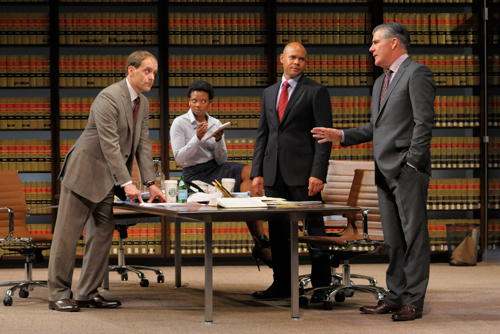
Lights go up on a sleek, modern law office, where two attorneys, one white and one black, are pointedly driving their potential client, a wealthy white man accused of raping a black woman, toward the preliminary understanding that “there is nothing a white person can say to a black person about race which is not both incorrect and offensive.”
This would prove a decent mantra for the semi-comedic Race, in which the two lawyers, Jack Lawson (Anthony Fusco, white) and Henry Brown (Chris Butler, black), along with their legal assistant, Susan (Susan Heyward, black), scramble to assemble a defense for the accused Charles Strickland (Kevin O’Rourke). It would also call for an unavoidable, rather ironic addendum: the playwright, David Mamet (Glengarry Glen Ross, The Untouchables), is white.
While Mamet’s script is certainly offensive (the N-word is generously flung about) and at times severely polemic (“I would be mortified to go through life knowing I had been given a dispensation because of my race, and I’m ashamed of her [Susan] for doing it,” says Brown, violently uncorking the affirmative action question), it cannot be dismissed as “incorrect,” at least not outright.
The legal world, with its bountiful opportunities for brusque, unsparing, and at times dizzyingly rapid verbal crossfire, makes for a great range on which Mamet may broach, or, in this case, riddle the subjects at hand.
It also fosters writerly self-indulgence approaching Aaron Sorkin levels – delightful, up to a point. At times, Mamet packs his tit-for-tats so tightly as to make them impenetrable to all but the most speed-addled audience members. As a result, chunks of the play, particularly toward the beginning, are dense enough to become petrified.
The play’s most powerful moments assume a strikingly different rhythm. In these, characters are forced to exit the intractable narratives in which they had grown comfortable. Strickland must confront the fact that his schoolboy ribaldries about “black pussy” were, to his black college roommate with whom he shared them, not tokens of camaraderie but abject humiliation. Lawson must reassess the apparent ingenuousness of Susan, his legally unimpeachable equal-opportunity hire.
These conceptual evictions bring to a halt the breakneck mental web-spinning and lawyerly showmanship that Lawson and Brown typically emit. The characters that endure them – Strickland with regard to his old roommate and Lawson with regard to his intern – transcend the play’s legal battleground.
Despite its occasional moments of political charge, Race resists being boiled down to any one message; it’s too complex for that. The central issue seems surmountable one moment, intractable the next. Either way, Mamet demonstrates, the significance of race remains more pervasive than many of us would care to admit. One thing is clear though, and there’s hope in it: “Fifty years ago,” Brown says to Strickland, “You’re white. Same case. Same facts. You’re innocent.”
Race runs through 11/13 at the American Conservatory Theater
Want more news, sent to your inbox every day? Then how about subscribing to our email newsletter? Here’s why we think you should. Come on, give it a try.









